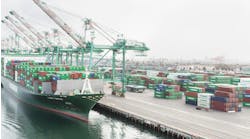The news that technology products distributor Tech Data would cease its commercial operations in Brazil this year came as little surprise to many companies doing business in that country. Though Brazil is home to one of the fastest-growing economies in the world, it is also a place where complex tax laws and government regulations make it difficult for foreign companies to operate profitably. Those succeeding in the market say it takes local expertise and innovative thinking to make a go of it in many South American countries.
Still, South America—and Brazil in particular—is becoming a more attractive target for companies from all over the world as its growing middle class demands everything from infrastructure improvements to consumer electronic devices. This makes the market especially attractive to the electronics supply chain, and original equipment manufacturers (OEMs), contract manufacturers (CMs), and distributors are seeking ways to capitalize on business growth in the region.
Whether that means supplying products to help the country prepare for the 2016 Olympic Games or producing enough of the latest and greatest smart phones to satisfy consumer demand, electronics companies are playing a vital role in the region’s economy. For many, navigating the complex government rules and regulations means taking an extra-sharp look at how they conduct business locally and changing their strategy, if necessary, to succeed.
“We are one global brand, but we have two very unique businesses because of the way we go to market in Brazil,” notes Rebecca Kritzman, a spokesperson for Palladium Energy, a leading manufacturer of custom lithium-based battery packs used in a wide range of markets, including consumer electronics, medical devices, and the Smart Grid.
In Brazil, the company’s business extends beyond traditional design and manufacturing to include custom design and manufacturing for other companies looking to expand their business in the region. Palladium Energy’s long history in Brazil and knowledge of local rules and regulations make it a valuable partner to product designers and manufacturers, Kritzman says. The company has been doing business in Brazil for 15 years, with regional business expert Renato Pantoja at the helm as vice president of business development for Palladium’s South America region.
Value-added strategies such as these are helping foreign companies navigate the maze of complex tax regulations and local content requirements so they can take advantage of the region’s many and growing business opportunities. Brazil is now the sixth largest economy in the world, having grown 2.7% last year to reach $2.5 trillion—surpassing the United Kingdom, which grew 0.8% last year to $2.48 trillion. Such opportunities are creating new interest in South American markets every day.
Complexities Abound
Tech Data, which distributes computer products to value-added resellers and retailers worldwide, cited Brazil’s complex tax, legal, and regulatory environments as reasons for ceasing its commercial operations in the country earlier this year. The company said the environment made it difficult to generate a sufficient return on invested capital, and it noted that it would incur operating losses and other charges of nearly $25 million in the fourth quarter this year as a result of the Brazilian closure. Tech Data continues to serve the Brazilian market through its Miami export operation.
Such situations are providing important lessons for other companies operating in the region, and distributor Avnet Electronics Marketing is one. Avnet gained a large presence in Brazil following its 2010 acquisition of Bell Micro, which had a successful commercial components operation serving the country from a location in Miami.
Today, Avnet Inc. has expanded its business in Brazil and provides its entire technology offering to the region, including computer systems, electronic and commercial components, embedded systems, logistics, and integrated sources, according to Jose Luis Vara, who oversees Avnet’s business in the region. A Brazilian national, Vara came to Avnet through a local acquisition 10 years ago, and he now uses his market knowledge and understanding of Brazilian government complexities to keep close tabs on the distributor’s operations there.
“[Because of the] high level of bureaucracy in Brazil, the regulations, and the taxation system, there is a very high cost of doing business [there],” says Vara, noting that local tax law can change on a moment’s notice. What’s more, the current exchange rate is unfavorable to the U.S. dollar, making it more expensive for American companies to do business in Brazil today.
But the high cost of doing business is not a deterrent for distributors such as Avnet, Arrow, Future Electronics, and others with local operations in Brazil. Companies go to Brazil because of the potential to do business there, not because of its affordability (or lack thereof), Vara explains, pointing to Brazil’s population of 200 million people and their growing consumer power.
High inflation that plagued the country 15 to 20 years ago has eased, giving consumers more wealth and fueling economic expansion. Infrastructure projects related to the Olympics and the 2014 World Cup are also a plus, as are general infrastructure projects aimed at bringing new services and technologies to consumers.
Ed Smith¸ president of Avnet Electronic Marketing Americas, emphasizes the importance of local market expertise when developing business in South America, and points to some of Avnet’s recent efforts to stay abreast of local trends and issues.
“It’s an area that you can’t just treat like the rest of the world,” explains Smith, pointing to the extensive financial and accounting system Avnet has put in place in Brazil—in the form of both people and technology—as just one example. “We’ve built an accounting infrastructure [there] like nowhere else in the world.”
The reasons behind that are many and varied, and they include the country’s complex tax structures governing import/export activities as well as inter-state commerce. Most of Avnet’s business in the country is based on selling and shipping from the United States and billing in U.S. dollars as a way to avoid some of the tax and exchange rate difficulties.
And like Palladium Energy, Avnet is changing its business structure in Brazil, moving from a sales-based business to a service-oriented structure, which should ease the burden of Brazil’s import/export tax. Avnet will operate two integration centers in Sau Paulo, Brazil’s most populous state and a regional center of commerce and finance. Avnet has one existing integration center in the state and will open a second one this spring in Jundiai, a city roughly 40 miles north of the capital.
The integration centers provide value-added services similar to those offered by Avnet’s existing integrated service centers in North America, which provide product lifecycle management services such as electronics repair, supply chain management, and recycling programs. Much of the business is related to Avnet’s embedded services business, which combines its electronic component and technology solutions business to serve customers’ embedded technology needs.
“To get around the tax obstacles, we’re going to change our business [in Brazil],” says Smith. “Our components business will start transitioning from a commercial business to a value-added business.”
“Avnet has been looking for ways to increase our value-added and increase our margins to afford our presence down there,” adds Vara. “This is one way to do that.”
In many ways, balancing the risk and reward of doing business in Brazil means keeping an even sharper eye on standard business practices such as personnel expenses, inflation, real estate, and tax issues while also seeking new opportunities to grow, as Avnet has done with its newest integration center. Vara says the company chose the Jundiai location in large part because of the tax incentives the state of Sau Paulo was offering to new businesses in the region.
“In Brazil, you have to have operations down there, but you have to keep your eyes very open to the cost of operating there,” Vara explains. “For example, salaries are [adjusted] to inflation every year by law.… Many companies don’t pay attention to that. You also have to keep your eyes close to other expenses such as real estate, travel, and entertainment. You have to keep all of that under control.”
Avnet does business in Chile, Argentina, Ecuador, and Columbia as well. Although each country has its nuances, Smith and Vara agree that Brazil is by far the most complicated South American country in which to operate.
Opportunities Remain
Despite the complexities of doing business in Brazil and other South American countries, Palladium Energy’s Renato Pantoja says the outlook is bright for business development in the region and that there’s much room for growth between U.S. companies and Brazil in particular. The United States is Brazil’s third largest trading partner, behind Asia and South America, respectively. As local content laws evolve, he says he expects more companies based in the United States to enter the market. Local content laws govern the number or percentage of a product that must be made locally.
“The government starts with the local content laws on the end products... and then as time goes on they start to modify local content laws for additional components to be developed in the country,” Pantoja explains, pointing to Palladium’s evolution from supplying lithium-based battery packs for consumer electronics industries to providing printed-circuit board assembly, electromechanical components, and power supply units for notebook computers, TVs, set-top boxes, and printers. “There are a number of new ideas and new components that are becoming local content requirements.”
In addition, Pantoja points to information technology, broadband, digital television, and the energy market as key growth drivers in Brazil over the next few years. He also notes that the cell-phone industry continues to grow. Such factors create abundant opportunities for companies willing to try and balance the risks and rewards of doing business in Brazil and elsewhere in South America.
“Our intention is to grow our presence in Brazil, but also to serve our existing customers,” explains Avnet’s Vara. “Our U.S. customers want to do business in Brazil, so Avnet wants to help them do that. We’re going to help them take their products to the country.”







